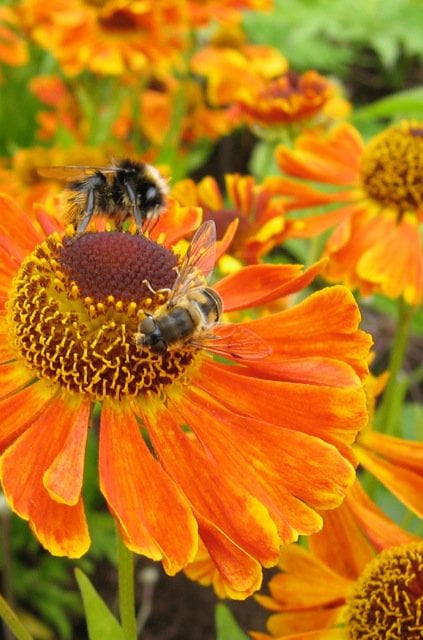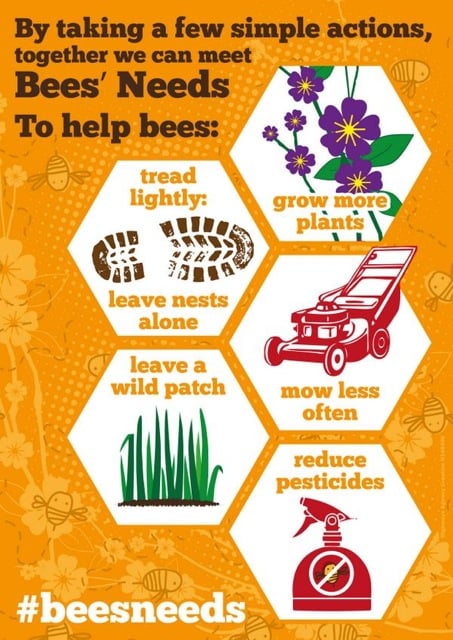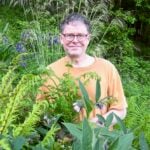Dumbing down the National Pollinator Strategy is unlikely to inspire gardeners to take their vital role seriously – so it’s hardly going to help the bees.
My job, as an independent gardening writer, is not just to tap out occasionally colourful, hopefully informative, possibly thought-prodding and – dare I say it – sometimes witty prose about my own and others’ experiences of getting our hands in the soil. It’s also about listening to what’s going on in the gardening world, about tuning in to the chatter passing between us gardeners, and to the gardening-related messages (good, bad and downright ugly) beamed out to us by government, organisations, charities, businesses, other gardening writers and broadcasters, and the wider media.
If, like me, you’re totally in love with gardening, and utterly convinced of its infinite potential in a living world beset by largely human-made pressures – it offers us sanctuary, insight, delight, just for starters – the watching and listening bit is sometimes painful going. As a gardener and writer who sees no fake divide between gardening and the natural world (despite sustained efforts by some of my business-loyal peers to conjure one), it often has me shaking my copper trowel at the moon. Full-on howling is rare, but some recent media froth had me giving the local fox a run for his blood-curdling money.

After months of wondering, wishing and waiting, gardeners have been let in on the official plan for pollinators. Nudged into action by a buzzing, people-powered campaign, the government has finally launched its ‘National Pollinator Strategy’ (NPS) on an expectant world. This initiative, which has received input from organisations of every denomination (including lobbyists), is intended, over the next 10 years, to ‘… build a solid foundation to bring about the best possible conditions for bees and other insects to flourish.’ The back-garden offshoot of the NPS is called ‘Bees’ needs: food and a home’ and is plugged as how ‘everyone can play their part. So whether you are a farmer, a gardener, or a manager of urban or amenity spaces, there is something you can do to help our valuable insect pollinators.’
There then follows a clarion call on ‘five simple actions for pollinators’, namely ‘grow more flowers, shrubs and trees’, ‘let it grow wild’, ‘cut grass less often’, ‘don’t disturb insect nests and hibernation spots’, and ‘think carefully about whether to use pesticides’. Each action is accompanied by basic information, some of it pretty ropy (what does ‘cut grass less often and ideally remove the cuttings to allow plants to flower’ actually mean?), but there are links to better stuff, information sheets and case studies (although naturally you need to be online to access it all).
This hotchpotch of advice is aimed at prospective bee saviours of all hues, while the lobbyists show their hand in phrases like ‘think carefully about whether to use pesticides’. Strong voices explaining why pesticides aren’t needed in a healthy, balanced garden are absent (where is that once campaigning, inspiring, gentle behemoth Garden Organic when you need it?). Where is the warning about insidious, polluting neonicotinoid pesticides, or ‘neonics’, which are sold in garden centres, supermarkets and shops (real and virtual) across the land? Few gardeners, even the most seasonally ephemeral, could have failed to read or hear about neonics recently – so why no link to a list of them? Even the picture at the top of the ‘think carefully’ page is of garden pesticides available not here, but in the USA; a blunder, or another bow to corporate pressure? Surely The Royal Horticultural Society, the only real gardening organisation supporting the initiative, ought to have spotted that? Could no one have had the gumption to say that in a gardening context you simply don’t need to use pesticides?

Predictably, much of the media fizz around the NPS’s launch, especially from journalists clearly clueless about gardening, focused on the ‘cut grass less often’ message, with its nod to laziness. Here again, the advice is ambiguous at best; it suggests not cutting lawns ‘after September as this will help to protect bumblebee nests… It will also help the caterpillars nesting there…’ Caterpillars of what exactly? Certainly not bumblebees. It’s tough reading this kind of stuff, especially when it’s aimed at the tens of millions of folk who are best placed to help put the skids on the quickening decline of nature: gardeners. But it gets even tougher.
On the day the NPS launched, the Department for Environment, Food and Rural Affairs (Defra) took to social media to spread the word. On Twitter, it used the hashtag ‘#beesneeds’ to link a series of tweets publicising the NPS, mostly accompanied by cartoon-style graphics. These depicted the five ‘simple actions’, reinforced – as if we gardening dumbos needed it – with drawings of flowers, a footprint, blades of grass, a lawnmower and a pesticide spray-gun. Not content with dumbing down, Defra added extra puerility with a dose of exclamation marks! No one seemed bothered, but why would they – after all, it’s not actually serious stuff, is it? – and so the vacuous tweets were shared far and wide. As ways to convey a message go – especially one this important – it was hardly the bee’s knees.
It’s time to stop talking down to gardeners, and to take gardening, gentle and unassuming as it is, more seriously. It doesn’t matter whether you’re a government department, a non-government body, a journalist, a business, or a broadcaster, please just stop it; we’re not numbskulls. We’re up there with the best when it comes to taking direct, meaningful action by creating beautiful sanctuaries for bees, other insects and all wild things, right outside our back doors; we’re giving nature somewhere safe to pitch up while we try to sort our dysfunctional agricultural landscape. Gardeners are already up close and personal with wild nature, and we don’t need patronising quite so much, quite so often. So please, just stop it.
Follow John on Twitter @earthFgardener
Text and images © John Walker


